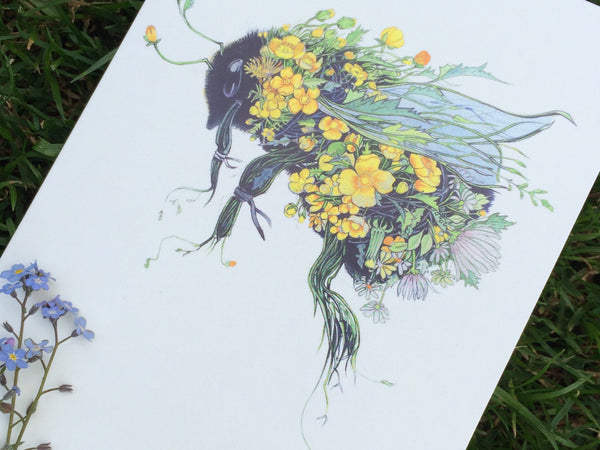There's no question

Allow me to transport you to a beautiful midsummer afternoon:
A distant cry can be heard from a pair of buzzards, effortlessly soaring high amidst a brilliant blue sky, crickets chirp away hidden in the tall wild grass, whilst a collared dove coos lazily in the shade of a shimmering tree. Life is good: summer has brought with it the bounties of nature, and after a full-on and hectic spring, our wildlife can now surrender to the warmth of the sun and take a well deserved rest.
For some animals though, there is no chance of relaxation, some creatures are under the rule of a demanding queen: they are the workers and drones, who's sole purpose is to provide for their monarch and maintain the colony, at all cost. Nectar is needed, and lots of it - they are busy bees indeed.
But it's not just queen and colony who needs the honey bees to keep slaving away in the heat, the whole of nature depends on them, including us, because without these most critical of pollinators, we could lose the very plants and crops they fertilise; and if we're talking crops, that includes a staggering 70% of our crop species, which, in turn, feeds 90% of the worlds human population.
Scientists and naturalists are now singing from the same hymn sheet, and we all need the worlds farming industries to sing along too, because the increasing use of aggressive pesticides and diminishing resources of wildflowers are slowly killing off the bees.
We can all play a modest part in helping the bees by planting beautiful wildflowers which are high up on the bees nectar menu, such as lavender, poppies, forget-me-not's, and basil, and be sure to use bee-friendly pesticides.
“If the bee disappeared off the face of the earth, man would only have four years left to live.”
― Maurice Maeterlinck: author of 'The Life of the Bee'
It's not just modern man who realises the importance of the humble bee: this insect has often been held with the highest regard throughout history. Many gods from various ancient cultures were associated with bees: including Pan, Cybele, Ra, and Aphrodite. The ancient Egyptians used a honeybee as a symbol for their monarchy, for the Celts the bees were associated with wisdom, and were messengers between our world and the spirit realm, and the Greeks believed that an infant whose lips came in to contact with a bee was then destined to become a great orator or poet.
"Concerning the generation of animals akin to them, as hornets and wasps, the facts in all cases are similar to a certain extent, but are devoid of the extraordinary features which characterise bees; this we should expect, for they have nothing divine about them as the bees have."
― Aristotle 384 BC – 322 BC
To bee, or not to bee? For me, there is no question!
See Daniel's completed Bumblebee design - available as greetings card or art print
Shop the whole DM Bugs and Butterflies Collection
